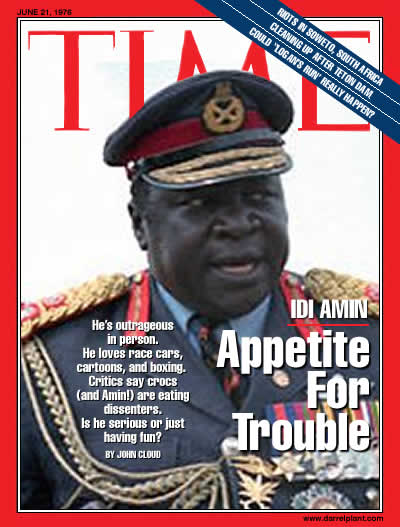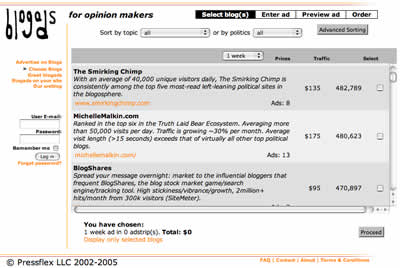The third in a series based on John Cloud’s justification for writing a puff piece on Ann Coulter and because it’s so damn easy to do these:

Those who do not learn from history are stupid
The third in a series based on John Cloud’s justification for writing a puff piece on Ann Coulter and because it’s so damn easy to do these:

TIME writer John Cloud in an interview with Brian Montopoli of CJRDaily about Cloud’s cover story on Ann Coulter (for which the cover line read “Ms. Right: Fair and balanced she isn’t. This conservative flamethrower enrages the left and delights the right. Is she serious or just having fun?”):
Brian, Brian, we have put Josef Stalin on the cover. We have made Adolf Hitler the person of the year.
I’ve done a little digging to find the covers of TIME in which Cloud’s interviews of Stalin and Hitler appeared, oddly enough from the same date in 1933.


My letter to TIME magazine, 19 April 2005:
Ten years ago today, Timothy McVeigh bombed the Murrah Building in Oklahoma City. Three years ago, this week’s cover subject, domestic terror advocate Ann Coulter, said she wished McVeigh had gone to the New York Times Building instead. My TIME renewal notice arrived in the mail today, and went straight into the recycling.
A letter to the Oregonian‘s Public Editor, Michael Arietta-Walden, 8 April 2005:
Mr. Arietta-Walden:
I’d like to once again bring your attention to the lack of factual accuracy in a syndicated column on the Oregonian‘s editorial pages.
On April 6, a column by James Lileks discussed the recent verdict in the Sandy Berger case [linked here from the Jewish World Review]. In the column, Lileks says:
Justice concluded that he didn’t really mean to destroy or cover up evidence of Clinton administration failings that might come up in 9/11 hearings. But it seems somewhat inconsistent with Berger’s own admission that he scissored the things to shreds, no? Ah, but they were copies, that’s all. Nothing more. But were they copies with damning notes in the margins, perhaps?
The last comment, echoing the conspiracy theory that Berger was covering up incriminatory handwritten notes on the pages he destroyed, was refuted by the Department of Justice’s report on the matter, as well as much of the actual reporting. Even the reliably-conservative Wall Street Journal‘s editorial page derided this point today [8 April 2005]:
On Wednesday, we quoted Justice Department prosecutor Noel Hillman that no original documents were destroyed, and that the contents of all five at issue still exist and were made available to the 9/11 Commission. But that point didn’t register with some readers, who continue to suggest a vast, well, apparently a vast left- and right-wing conspiracy. The Washington Times, the Rocky Mountain News and former Clintonite Dick Morris have also been peddling dark suspicions based on misinformation.
The confusion seems to stem from the mistaken idea that there were handwritten notes by various Clinton Administration officials in the margins of these documents, which Mr. Berger may have been able to destroy. But that’s simply an ‘urban myth,’ prosecutor Hillman tells us, based on a leak last July that was ‘so inaccurate as to be laughable.’ In fact, the five iterations of the anti-terror ‘after-action” report at issue in the case were printed out from a hard drive at the Archives and have no notations at all.
I know Lileks is syndicated by the Oregonian‘s parent company, but that’s no excuse for shoddy journalism. This isn’t a difference of “opinion.” The prosecutor in the case said there was “no evidence that Mr. Berger had intended to hide anything from the Sept. 11 commission” (New York Times). “Archives officials have said previously that Berger had copies only, and that no original documents were lost” (Washington Post).
Lileks’s entire column is premised on the idea that Berger was trying to cover up Clinton administration “malfeasance,” but that claim falls apart if the fact that he only destroyed copies from a printer enters the scene. So Lileks doesn’t mention that, either because he’s too lazy to read the news reports (but not too lazy to write several hundred words about Berger) or because he’s flat-out lying. And by printing inaccurate or deceitful “opinions” like this one, the Oregonian is perpetuating that viewpoint; one that even the Wall Street Journal editorial board doesn’t find credible any longer.
It’s difficult to tell whether John Micklethwait and Adrian Wooldridge (writers for The Economist) were simply ignorant or deliberately deceitful in their syndicated opinion piece on European entrepreneurism seen through the lens of the wildly-successful British television series “The Office” and its currently-running American version.
The conceit of both shows is a mock documentary filmed in the divisional branch of a paper supplies company, run by an inept manager (played by Ricky Gervais, the show’s co-creator in the BBC version, and by former The Daily Show With John Stewart operative Steve Carell on NBC). The character (David Brent in the UK, Michael Scott in the US) is supremely confident in his own abilities. He believes he’s not only incredibly funny, but that he’s musically talented, and that everyone who works for him loves him and loves their job because of him. On this point he’s completely wrong. Seeing him screw up his office and the lives of the people who work under him in either version is one of the most cringe-inducing television experiences next to watching surgery. The character’s not a complete jerk — he seems to believe he’s doing a great job — but you can see the train wreck coming if you’ve got any brains.
Micklethwait and Wooldridge don’t seem to have ever watched the show, however. Or if they did, they appear to have gotten an entirely different message out of it. In their analysis, “Britons immediately identified with David Brent, the work-averse boss in the Slough office of the paper company Wernham Hogg, was because his casual ‘It’s just a giggle, really’ attitude to management reflected their own prejudice.” Oh, really?
While there is a section of the BBC site dedicated to Brent “lookalikes,” the original series rarely cast David Brent in a positive light. He was someone everyone laughed at, not with, and was certainly not portrayed as someone who should be emulated. Toward the end of the show’s run, the employees of Wernham Hogg are referring to Brent as “Bluto” and “Mr. Toad.” The first line of a 2003 Telegraph interview with Gervais reads: “Ricky Gervais is loved by audiences almost as much as David Brent, his most successful creation, is loathed.” Perhaps the character does represent British prejudices, but about managers rather than about work in general.
To anyone who actually watched the shows, the point should have been ground in by the ascension of Neil Godwin, Brent’s counterpart at another branch of the company in the second season. Godwin is given a position superior to Brent’s when the offices are merged, and he proves to be everything Brent is not: genuinely funny, professional, and caring about others. The relief among the workers when he takes charge and Brent is eventually “made redundant” is palpable.
Given these omissions and the bizarre conclusions they reached about why The Office was a hit in Europe, it’s a bit difficult to give any credulity to Micklethwait and Wooldridge’s argument that the European focus on quality of life is holding them back from entrepreneurship & mdash; unless, of course you’re Kevin Drum, who hasn’t watched it yet but thnks “they seem to be on the right track.”
Micklethwait and Wooldridge say “Brentism helps explain why Europe has no Silicon Valley, no Bill Gates, no Warren Buffett.” They have, however had people like Karl & Theo Albrecht (self-made German magnates who own Trader Joe’s, part of Albertson’s, and were listed at #3 on Forbes’s 2003 list of “The World’s Richest People”, right after Gates and Buffett) as well as four other members of the top 20 slots that year. As for Silicon Valley, it’s difficult to know whether they’re referring to the chip manufacturing (much of which is now done in Asia) or the software development (much of which is now done in Asia).
If anything, “The Office” might be seen as the perfect mirror for the current US administration — far better than any “Saturday Night Live” skit or the sophomoric comedy of the mercifully short-lived “That’s My Bush.” While Micklethwait and Wooldridge figure that Americans “don’t really ‘get’ the humor of ‘The Office’,” what is there not to “get” about the story of an incompetent, deluded guy who’s in charge of the lives of people who have to manage to survive despite his blunders? Oh, we get it.
Over the past year we’ve seen credit for bringing down the Soviet Union given first to President Ronald Reagan then extended to Pope John Paul II, on the occasions of their passing. Much ink was shed on how they’d provided the mighty rocks of Western civilization upon which the USSR was wrecked.
I have my own theories about how corruption, mismanagement, and overextension of power had weakened the Soviet structure before either of those men came on the scene, but since everyone’s been giving the big guys a salute for standing up to power from Washington and the Vatican City, respectively, I’d like to nominate another entity that did more to show the weakness of the regime than either of them did, and at greater personal risk: the Solidarity union.

Established in on August 31, 1980, a year-and-a-half after the Pope’s victory lap through his home country (a true sign that the Soviets were losing their grip in Poland), eight months after the Soviet invasion of Afghanistan, and two months before Ronald Reagan was elected President, Solidarity began chipping away at Soviet control of Poland.
The members of Solidarity, including its original leader Lech Walesa, were on the forefront of the struggle against a totalitarian system. They were the people with their jobs, homes, families, and lives on the line. They and the people of other Eastern Bloc countries who risked — and in some cases lost — it all are the people who deserve the real credit for ending the Soviet system.
I’ll be over here holding my breath until I hear everyone who praised Reagan and John Paul II give credit to a union.
Poking around on Blogads, I saw something that didn’t quite click with me, mathematically. On the part of the site where you can select ad venues, the MichelleMalkin.com site’s description (not gonna link) mentions that its traffic (listed as more than 50,000 visits a day) “is growing ~30% per month.”

Think about that for a second. Thirty percent growth per month. At that rate, 50,000 visits compounds to 375,000,000 (roughly the population of the US) in only 34 months. Everyone in the US is going to be reading Malkin by the next election.
That is, they would be if the claim were true. Of couse, there’s no possible way Malkin’s site could have a sustained rate of 30% growth per month. If you take it the other direction, numbers start dropping off pretty quickly. One month before it hit 50,000, the number would have been about 38,500; then 28,600; 22,750, etc. Two years ago, 100 readers.
If you’re going to fudge the truth to anybody, you might as well do it to people willing to advertise on MichelleMalkin.com.
Via Atrios, House Progressive Caucus member Representative Peter DeFazio (D-OR) yesterday (PDF), on the subject of President George W. Bush’s War on Social Security Trust Fund bonds:
This is a Social Security Trust Fund bond, considered the best investments in the world, U.S. Treasury Bond. This is the most privileged of Treasury bonds issued to Social Security, redeemable at any time at full face value, unlike any other bond that they issue. These are the most privileged of their bonds. The President says it is nothing but an IOU. Well, here is what it says: This bond is incontestable in the hands of the Federal Old Age and Survivors Insurance Trust Fund. The bond is supported by the full faith and credit of the United States. And the United States is pledged to the payment of the bond with respect to both principal and interest.
The President questions that? He is questioning whether we are going to repay our most privileged debt to Social Security. We have $7.9 trillion of debt. He is adding to it at a record rate, borrowing $1.3 million a minute. Who is he saying we are going to repay and not repay?
Are we going to repay the Chinese but not the Social Security Trust Fund? Are we going to repay President Bush, he happens to have some U.S. Treasury Bonds in his personal portfolio, but not the Social Security Trust Fund? Are we going to repay other wealthy investors around the world and in the U.S., but not the Social Security Trust Fund? We are going to selectively default on our debt.
What are we going to pay them back with? SPITBALLS?
The fly in the smear that the Bush administration is painting on the CIA for bad Iraqi WMD intelligence (apart from Bush’s honoring of George Tenet with a Presidential Medal of Freedom) is that the WMDs were only the raison d’guerre.
Even if the CIA had screwed up the WMD estimates without meddling from the White House (which I do not believe), even if every other Security Council nation believed Iraq was an imminent threat (apparently they didn’t, because they mostly stayed in the Uncoalition of the Unwilling), the rest of the intelligence on Iraq was (and remains) a failure as well.
The dozens of “decapitation” strikes meant to take out Saddam before the invasion didn’t work. The planning of the occupation didn’t work (three administrators and counting). Two years after Germany and Japan fell in WWII, American troops were not fighting insurgents and getting bombed outside of prisons. This is sheer incompetence.
It’s nice to see the little people win big and it happened today when the Pulitzers were announced and Nigel Jaquiss of Portland, Oregon’s alternative weekly newspaper Willamette Week won the Investigative Reporting prize for 2005, despite being up against reporters from dailies The New York Times and The Des Moines Register.
Some of you may remember the story of how former Oregon governor and Carter-administration Transportation Secretary Neil Goldschmidt — the biggest name in Oregon politics for the past 30 years — fell from grace when his sexual abuse of a teenage girl during the time he served as Portland’s mayor in the 1970s was finally exposed. You may remember how the Northwest’s biggest daily, the Oregonian tip-toed around it and referred in a headline to a married, 35-year-old man having sex with a 14-year-old as an “affair” in their attempt to simultaneously scoop Willamette Week and play nice with Goldschmidt.
You may know that the fallout of the story led to Goldschmidt’s resignation from the board of a shell corporation set up to buy Portland General Electric, a major Enron asset; a deal that was virtually assured while he was involved but which received far more skepticism without his involvement, was exposed as a bad deal for ratepayers, and has since collapsed. This is going to have to twist the knife for the Oregonian, given that they knew about the story months before it broke.
Congrats to Mr. Jacquiss and all his co-workers (full disclosure: my wife was the theater reviewer for WW in the early ’90s). Apparently this is only the fifth time an alternative weekly has won a Pulitzer. Maybe one of these days the big papers can get back to doing some investigative journalism.